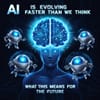Artificial intelligence is advancing at a pace that most people still don’t fully grasp. The technology is evolving so quickly that what seemed like a far-off possibility just a few years ago is now becoming a reality. From how we work and live to how businesses operate and innovate, AI is starting to shape the world in ways that were once unimaginable. And the pace of change? It’s only accelerating.
Take a moment to think about the AI tools we use today—personal assistants like Siri and Alexa, recommendation systems on Netflix and Amazon, and even AI-driven customer service bots. These tools are already ingrained in our daily lives, but they represent just the beginning of what AI can do. More advanced systems are now capable of performing complex tasks that once required human intervention, such as analyzing medical images, writing news articles, or even composing music. In fact, the level of sophistication AI has reached is already raising questions about what the future holds—and how soon it will get here.
One of the most fascinating aspects of AI’s rapid growth is how it’s driving innovation in fields we might not immediately associate with technology. Healthcare, for instance, is already benefiting from AI’s ability to process vast amounts of data quickly and accurately. AI-powered systems can now help doctors diagnose diseases earlier, personalize treatment plans, and predict patient outcomes more reliably than ever before. Similarly, industries like finance, logistics, and manufacturing are using AI to streamline processes, reduce costs, and boost productivity in ways that weren’t possible just a few years ago.
What’s truly remarkable is how quickly these advancements are happening. Breakthroughs that were once thought to be years away are now coming to fruition in real time. AI is becoming smarter and more capable with each passing day, and it's already starting to outpace our ability to fully understand or predict its impact. This rapid evolution presents both opportunities and challenges. On one hand, AI holds the potential to solve some of the world’s most pressing problems, from climate change to healthcare access. On the other hand, it raises significant concerns about privacy, job displacement, and the ethics of machine decision-making.
So, what does this mean for the future? As AI continues to evolve, it’s clear that we’ll need to rethink how we approach everything from education to employment. The workforce of the future will likely include a greater reliance on AI-powered tools, which means people will need to adapt by acquiring new skills and learning how to work alongside these systems. While some jobs may be automated, new opportunities will arise in industries that don’t even exist yet.
AI is changing the world faster than most of us realize. It’s reshaping industries, transforming everyday life, and challenging our assumptions about what’s possible. While we can’t predict exactly where it will take us, one thing is certain: the future of AI is already here, and it’s moving fast.


